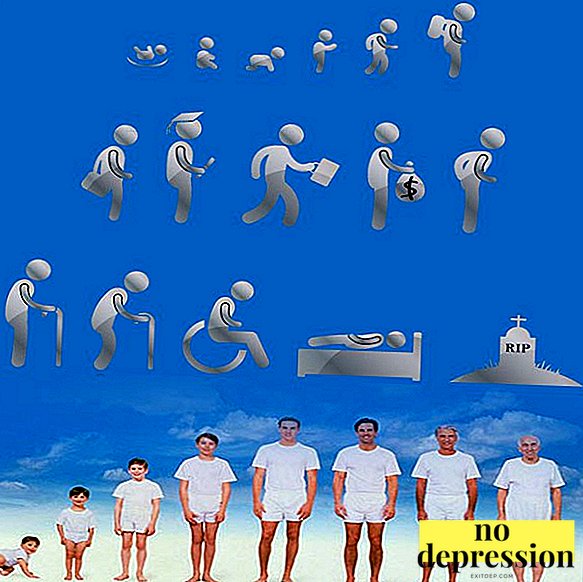When the baby is growing up and can clearly give signals that he wants to go to the toilet, the period of the pot comes.
But sometimes children flatly refuse to sit on the pot and poop in the pants, bringing parents to despair. What are the causes of fecal incontinence and how to deal with it?
What age is the norm?

The incontinence of feces in medical practice is called "Encoporez".
But if the child is simply not accustomed to the pot and socks his pants, this does not indicate a problem.
In young children and infants, bowel movement occurs. without reference to consciousness. The crumb just feels the urge and satisfies the natural need of the body.
Approximately 1.5-2 years the child is already ready to master the "toilet science". From the age of two he already recognizes the signals of his own body, controls the work of the intestines and can independently sit on the pot, or ask parents for help.
Potty training is a long and not always easy process. Parents should understand that sometimes a child can play, “miss a moment” or simply misinterpret their own feelings.
Therefore, if the soiling of the pants is sporadic, and the child is not yet 3 years old, don't panic.
If the child is more than three years old and involuntary bowel movement occurs day and night on an ongoing basis, it is worth taking control of the situation.
Psychology and causes of the problem

The causes of delicate problems can be very different, but conditionally they can be divided into three groups:
- physiological;
- neurotic;
- mixed
Physiological causes associated with the immaturity of the anatomical and physiological structures that regulate the process of defecation (intestine, liver, gall, pancreas). These can be congenital malformations, as well as injuries acquired as a result of illness.
Neurotic encopresis develops on the background of strong emotional experiences. This category includes the fear of parents, their aggressive behavior (including when teaching a child to the pot).
Promote the development of encopresis can be a depressing and harsh atmosphere at home or in kindergarten / school, stressful situations or strong emotional experiences about the death of a relative, divorce of parents, etc.
Mixed causes - These are neurotic disorders that entail disruptions in the functioning of the body. As a result, the child cannot control the act of defecation even after correcting the psychological status, since health problems do not allow establishing a connection between the brain and the intestines / controlling the sphincter.

Encopresis types:
- True encopresis. It is observed quite rarely (only 5% of cases) and is associated with impaired reactions in the part of the brain responsible for defecation. Appears on the background of psychological trauma and emotional experiences that have a negative color. In children suffering from true encopresis, hypoxia, birth trauma, and the risk of miscarriage are often observed in history.
- False encopresis. This type of fecal incontinence results from intestinal overflow against the background of constipation.
A common cause of a false encopresis is the regular suppression of the urge to empty because of uncomfortable external conditions (hostility, fear or shame when using a public toilet).
In 3-4 years
Why a child poops in his pants at 3-4 years:
- Forced potty training. The kid doesn’t want to get accustomed to the pot, he has negative emotions or banal boredom due to his age, which is why he tends to avoid defecation in the pot.
- Adaptation. The child is experiencing an acute period of adaptation in kindergarten. Separation from parents, strangers and unfamiliar surroundings lead to neuroses. The kid deliberately protests or just forgets to crap on the pot because of stress.
- Passion. The child deliberately suppresses the urge to defecate in order to watch a cartoon or play a game. In another embodiment, he may be so keen on an interesting toy or book that he simply does not notice the involuntary bowel movement.
- Constipation. Chronic constipation leads to distention of the intestines. Fecal matter does not linger, and there is an uncontrolled defecation.
- Transitional age. In three years, the child begins a period of crisis. The kid can perform demonstrative actions, checking the "limits of patience" of parents and their reaction to the actions of the crumbs.
- Family problems. The child may roll into his pants because of the fear of irritable, raising his voice, applying punishments or raising his parents hand. But encopresis can be triggered by a lack of attention to the baby.
After all, attention (the parent has to change dirty laundry, undermine the child, hold an instructive conversation), albeit with a negative connotation, is regarded by the little provocateur as a desire for intimacy.
- Scare. A person who is under stress due to a strong startle or fear can not always control his basic reactions.
- The retaliatory punishment. If parents are too powerful, stern or criticize the child in trifles, he can “punish” them with dirty panties, making an act of defecation “out of spite”.

5-6 years old
Why does a child poop at 5-6 years:
- Constraint. A child may mistakenly regard people's reluctance to engage in conversations on “toilet themes”. The kid has a strong opinion that going to the pot is something shameful and forbidden. With such installations, a small person cannot ask for a toilet at a party, or go to public restrooms (especially if there are no doors).
The child is shy and tries to pretend that he does not want to crap. But as a result of prolonged retention, fecal masses come out spontaneously.
- Constant fear / stress. Severe experiences associated with a single accident or a regular stay in uncomfortable conditions for the psyche lead to encopresis.
- Health problems. Slow development, problems with the corresponding parts of the brain or directly with the intestines, sphincter and the organs of the gastrointestinal tract responsible for defecation lead to the fact that the child cannot independently control his natural needs.
- Interest. The child is so keen on his occupation (playing, watching a cartoon or a movie, talking to a friend, etc.) that he tries to “endure to the last” and does not have time to go to the toilet.

If you have not done this before

Why did the child begin to crap in his pants, if he hadn’t done this before?
If earlier the child was very tidy and complied with the rules of hygiene (used the pot), but suddenly began to crap in his pants, it means that he was in a stressful situation, and now he is going through this negative experience in the form conflict with your own body.
The cause of encopresis can also be cracks, polyps, and other bowel disease.
In this case, the child is simply afraid to crap, as it experiences pain during defecation. The kid suffers until the fecal masses come out spontaneously.
Psychological advice and practical recommendations
The child refuses to go to the pot: what to do?
If a child refuses to crap in the pot, you can not use the "whip" tactic. Screams, threats, rigor and violent attempts to accustom to the toilet will only exacerbate the problem.
If the problem is in the pot, you can try to find alternatives. Get a child toilet seat. And maybe the child will like to feel like an “adult”, which means that gradually he will get rid of the habit of crap in his pants.

If the child is not yet 5 years old, an effective method of dealing with “dirty pants” will be an introduction to the learning process. gaming moments.
Let the pot be an animated friend for the crumbs. Think up his name, and explain that the new friend is very kind and does not wish the child evil.
How to wean a child in cowards?
If you have noticed problems with spontaneous emptying in a child, do not panic. To start visit a specialist. You can start with a pediatrician who will schedule an examination program:
- consultation for the purpose of collecting anamnesis;
- general inspection;
- palpation of the abdominal cavity;
- feces;
- ultrasound examination of the digestive tract.
If the problem has a physiological cause (diseases of the gastrointestinal tract or congenital anomalies), the child will be prescribed medication and physiotherapy.
If the problem lies in the neurosis, the child will be sent to a psychologist for further in-depth work.
What can parents do?

Create positive atmosphere within the family and in kindergarten / school.
In no case can not conflict with family members in front of the child.
You can not raise your voice, openly show your discontent and punish a kid for nothing.
Do not focus attention (even in a positive way) on the delicate problem of the child. So the crumb will become more closed in itself and experience acute experiences against the background of feelings of shame and awareness of its own inferiority.
Talk with teachers / carers and nannies to prepare them to work with the problem. They also should not shout, resent, condemn or punish a child for involuntary defecation.
Good result gives a fairy tale therapy. Parents tell their fumes tale in which the main character is faced with the problem of "dirty pants".
In this case, the narrator does not put the hero in a negative light. It simply describes the character's behavior, explains the mistakes and suggests an alternative (correct) behavior pattern.
During the course of treatment, the child should not be allowed to watch movies / broadcasts and play video games, which can provoke acute experiences.
Can to captivate a child with a new hobby. This should be a quiet occupation of drawing, knitting, embroidering or sculpting.
Child is prescribed special dietpreventing constipation. The main menu includes:
- fruits;
- fresh vegetables;
- vegetable broths;
- prunes (pureed or raw);
- whole wheat bread;
- honey.

Meat and milk consumption minimized for the entire period of treatment. The baby is also supposed to drink plenty of liquids.
As a supplement, warm help is good. baths bedtime and sedatives.
Children who have low sphincter tone, designate home workouts: a special hollow tube with a diameter of 0.8 mm is inserted into the anus (3-4 cm deep), which must be squeezed with muscle force. The procedure is carried out 2-4 times a week.
Analyze the situation in the family. If there are hidden problems within the social institution, the treatment will not give results.
Show love and understanding to your child. At all stages of dealing with a sensitive issue, family support is very important to him. After all, incontinence does not happen at the whim of a baby! This is the result of physical or emotional problems.
Why does a child poop? Neurotic encopresis:



